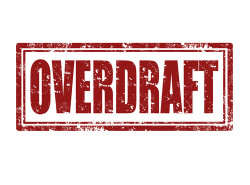Top Class Actions’s website and social media posts use affiliate links. If you make a purchase using such links, we may receive a commission, but it will not result in any additional charges to you. Please review our Affiliate Link Disclosure for more information.

Overdraft fees are what credit unions charge for fronting funds to cover transactions that would otherwise overdraw an account. Credit unions offer overdraft protection as an alternative to rejecting the draft due to non-sufficient funds, or NSF, and imposing an NSF fee.
Whether the credit union can automatically enroll a customer in overdraft protection is governed by federal regulations and depends on the type of transaction. For transactions involving checks and certain electronic payments, the credit union may enroll the customer in overdraft protection without their affirmative opt-in. Some institutions may allow customers to opt-out of overdraft protection for those types of transactions, but the customer may then be subject to an NSF fee in case of overdraft. The NSF fees are often the same as the overdraft fees.
For ATM withdrawals and one-time debit card transactions, the customer’s affirmative opt-in is required before the credit union may enroll the customer in overdraft protection and assess an overdraft fee. Federal regulations have required this opt-in since the summer of 2010.
Credit union customers with existing accounts at the time the rule went into effect may have received some paperwork from their institution offering them an opt-in for overdraft protection. Customers who opened new accounts after the rule went into effect may have authorized overdraft protection in the course of opening their account.
So what happens when the customer does not opt-in to overdraft protection for debit and ATM transactions? The credit union will decline any such transaction that would overdraw the account. While that rejection may cause embarrassment at the point of sale, it will not result in an NSF or overdraft fee.
Federal Protection Against Overdraft Fees
The 2010 federal rules require credit unions and other financial institutions to fully disclose the terms of their overdraft protection service, including the amount of the fees and the conditions under which they’ll be assessed.
These rules put the brakes on practices by certain credit unions and other institutions that used to generate millions of dollars in revenue from fees assessed to customers who may not have understood the terms applicable to their accounts. A study reported in 2007, prior to the new federal rules, said that consumers had been paying over $17 billion in fees annually.
Fee revenue has resulted in substantial capitalization for credit unions of all sizes. Some of the wealthiest credit unions in the U.S. today are local institutions that may not be particularly well-known outside their geographical regions, such as:
- DFCU Financial Credit Union (Dearborn, Mich.)
- Redstone Federal Credit Union (Huntsville, Ala.)
- Onpoint Community Credit Union (Portland, Ore.)
- Kinecta Federal Credit Union (Manhattan Beach, Calif.)
- Visions Federal Credit Union (Endicott, N.Y.)
Join a Free Credit Union Overdraft Fee Class Action Lawsuit Investigation
If you have incurred overdraft fees from a credit union, you may be eligible to participate in a free class action lawsuit investigation.
ATTORNEY ADVERTISING
Top Class Actions is a Proud Member of the American Bar Association
LEGAL INFORMATION IS NOT LEGAL ADVICE
Top Class Actions Legal Statement
©2008 – 2024 Top Class Actions® LLC
Various Trademarks held by their respective owners
This website is not intended for viewing or usage by European Union citizens.














